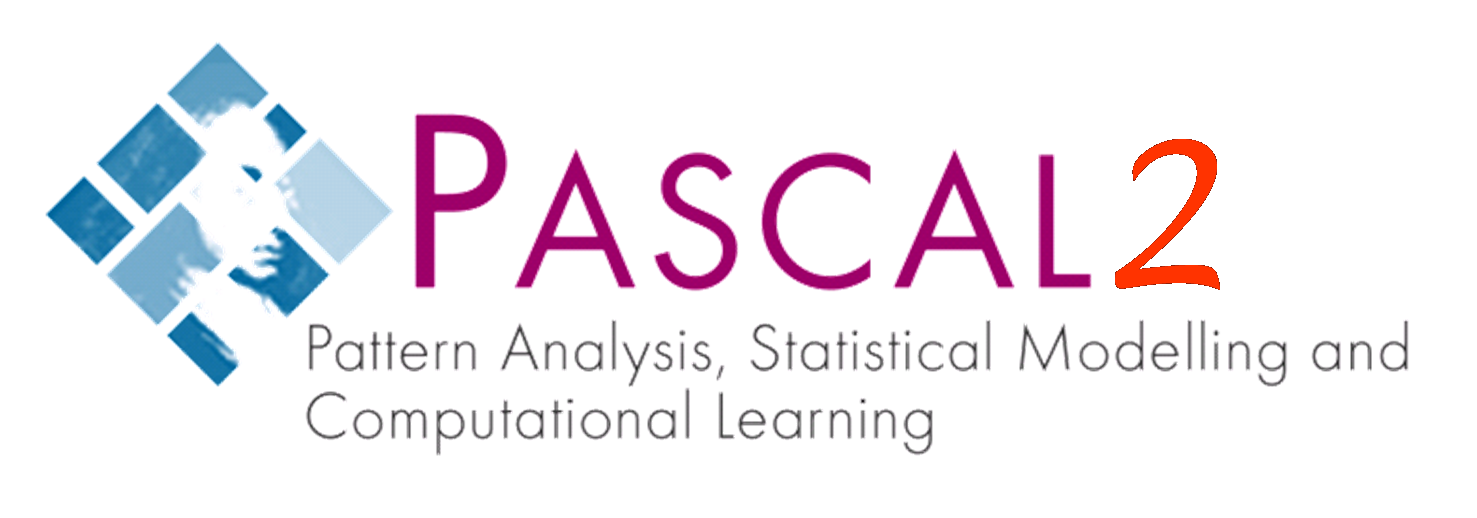Welcome to Social Web Mining Workshop, co-located with IJCAI 2011
International Workshop on Social Web Mining
Co-located with IJCAI, 18 July 2011, Barcelona, Spain
Sponsored by PASCAL 2
Great news: workshop videos available at Videolectures.net ( click here ).
Introduction:
There is an increasing interest in social web mining, as we can see
from the ACM workshop on Social Web Search and
Analysis. It is not until recently that great progresses have
been made in mining social network for various applications, e.g.,
making personalized recommendations. This workshop focuses on the study of diverse aspects of social networks with
their applications in domains including mobile recommendations,
service providers, electronic commerce, etc.
Social networks have actually played an important role in different
domains for about a decade, particularly in recommender
systems. In general, traditional collaborative filtering approaches can be
considered as making personalized recommendations based on implicit
social interaction, where social connections are defined by some
similarity metrics on common rated items, e.g., movies for the Netflix
Prize.
With the recent development of Web 2.0, there emerges a number
of globally deployed applications for explicit social interactions,
such as Facebook, Flickr, LinkedIn, Twitter, etc. These applications
have been exploited by academic institutions and industries to
build modern recommender systems based on social networks, e.g.,
Microsoft's Project Emporia that recommends tweets to user based on
their behaviors.
In recent years, rapid progress has been made in the study of social networks for diverse applications. For
instance, researchers have proposed various tensor factorization
techniques to analyze user-item-tag data in Flickr for group
recommendations. Also, researchers study Facebook to infer users' preferences.
However, there exist many challenges in mining social web and
its application in recommender systems. Some are:
- What is the topology of social networks for some specific application like
LinkedIn?
- How could one build optimal models for social networks such as
Facebook?
- How can one handle the privacy issue caused by utilizing social
interactions for making recommendation?
- How could one model a user's
preferences based on his/her social interactions?
We hope to gather scientific researchers and industry in order
to discuss the challenges, exchange ideas, and promote collaborations
across different groups.
Program:
The workshop program consists of 7 talks, a closing discussion, and four invited talks given by
- Ricardo Baeza-Yates, Yahoo! Research Barcelona, Spain
- Bhaskar Mehta, Google Zurich, Switzerland
- Jurgen Van Gael, Microsoft Research Cambridge, UK
- Qiang Yang, Hong Kong University of Science and Technology, China
Please find the detailed program here (updated on 15 July 2011) .
Please find the Workshop proceedings here (updated on 15 July 2011) .
Talk slides (except Ricardo and Bhaskar) available here (updated on 20 July 2011) .
Accepted Papers:
Paper No. 3:
The Blogosphere at a Glance---Content-Based Structures Made Simple (
pdf),
by Olof Görnerup and Magnus Boman.
Paper No. 4:
System-Wide Effectiveness of Active Learning in Collaborative Filtering (
pdf),
Paper No. 9:
Social-behavior Transfer Learning for Recommendation Systems (
pdf),
by Qian Xu, Wei Xiang and Qiang Yang.
Paper No. 10:
Classification of Social Network Sites based on Network Indexes and Communication Patterns (
pdf),
by Fujio Toriumi, Isamu Okada, Hitoshi Yamamoto, Hirohiko Suwa, Kiyoshi Izumi and Yasuhiro Hashimoto.
Paper No. 11:
Measuring Semantic Similarity using a Multi-Tree Model (
pdf),
Paper No. 13:
Recommending information sources to information seekers in Twitter (
pdf),
Paper No. 14:
Analyzing the Potential of Microblogs for Spatio-Temporal Popularity Estimation of Music Artists (
pdf),
Program Co-Chair:
Program Committee:
- Jean-Marc Andreoli, Xerox Research Centre Europe, France
- Cedric Archambeau, Xerox Research Centre Europe, France
- Guillaume Bouchard, Xerox Research Centre Europe, France
- Tiberio Caetano, NICTA - ANU, Australia
- Wei Chen, Microsoft Research Asia, China
- Boris Chidlovskii, Xerox Research Centre Europe, Grenoble, France
- Peter Christen, Australian National University, Australia
- Nello Cristianini, University Of Bristol, UK
- Hakim Hacid, Alcatel-Lucent Bell Labs, France
- Jian Huang, Google Pittsburgh, USA
- Jure Leskovec, Stanford University, USA
- Ernesto William De Luca, Technical University of Berlin - DAI-Labor, Germany
- Sherif Sakr, NICTA - UNSW, Australia
- Scott Sanner, NICTA - ANU, Australia
- Markus Schedl, Johannes Kepler University Linz, Austria
- Fabrizio Silvestri, ISTI CNR, Italy
- Julia Stoyanovich, University of Pennsylvania, USA
- Aixin Sun, Nanyang Technological University, Singapore
- Paul Thomas, CSIRO, Australia
- Antti Ukkonen, Yahoo! Research Barcelona, Spain
- Jie (Jessie) Yin, CSIRO, Australia
- Yi Zhang, University of California, Santa Cruz, USA
- Onno Zoeter, Xerox Research Centre Europe, Grenoble, France
Workshop Contact:
Email: Shengbo (dot) Guo@xrce.xerox.com
+33 (0)4 76 61 50 47 (Phone)
+33 (0)4 76 61 50 99 (Fax)
Mailing address: 6, chemin de Maupertuis, 38240 Meylan, France
Sponsor:


